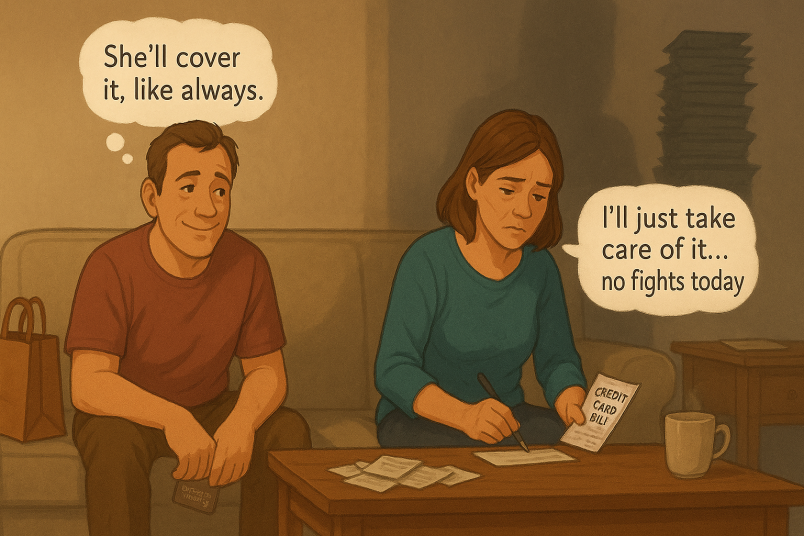What Is an Enabler in a Relationship: 13 Clear Signs to Identify One

Unlock Daily 30-Sec Tips for a Happier Relationship
👉 Subscribe FREEKey Takeaways
Marriage.com AI Quick Summary
Sometimes love makes us do things we don’t even notice—like covering up mistakes, brushing off bad habits, or saying “it’s fine” when it really isn’t. These small patterns can quietly grow into something bigger, something that keeps both people stuck.
If you’ve ever wondered what is an enabler in a relationship, think of it as constantly stepping in, fixing, or rescuing… even when it drains you.
It doesn’t come from a bad place—most of the time, it’s rooted in care, fear, or wanting peace. But over time, it can feel heavy, confusing, and quietly overwhelming!
What is an enabler in a relationship
An enabler in a relationship is someone who, often unknowingly, supports or allows unhealthy behaviors in their partner by excusing, covering up, or avoiding confrontation. Instead of addressing the problem, the enabler shields their partner from consequences, which can keep destructive patterns going.
For example: Imagine a partner who repeatedly overspends and hides bills. Instead of discussing the issue, the other partner quietly pays off the debt to avoid conflict. While it feels like a quick fix, this prevents accountability and deepens financial strain, leaving both feeling stuck.
Please note:
Realizing these patterns doesn’t mean you’re failing—it shows you care. Understanding what is an enabler in a relationship is the first step; learning how to stop being an enabler in a relationship comes with patience, gentle boundaries, and self-compassion. Change is possible, and it begins with kindness toward yourself.
13 clear signs to identify an enabler in a relationship
When we ask what is an enabler in a relationship, it often comes down to patterns that feel like “helping” but actually keep unhealthy dynamics alive. Recognizing these patterns matters because an enabler in a relationship may unintentionally encourage behaviors that harm both partners. Here are 13 clear signs.
1. Ignoring or minimizing the problem
Enablers often downplay the severity of the issue at hand, whether it’s addiction or other harmful actions. They may make excuses or justify the behavior, preventing the person from facing the consequences of their actions.
- Example: If a partner drinks heavily every weekend, the enabler might say, “It’s just how they blow off steam after work,” instead of acknowledging it as a harmful pattern that needs attention.
2. Rescuing or fixing
Enablers may have a strong urge to rescue their loved ones from the consequences of their actions. This can create dependency and prevent their partner from learning responsibility.
- Example: if someone repeatedly skips work due to late nights, the enabler might call their boss with an excuse to cover for them.
3. Overcompensating
Enablers may compensate for the other person’s shortcomings or failures by overcompensating in other areas. One of the examples of enabling is covering up a partner’s addiction by micromanaging their life.
- Example: If a partner regularly misses family events due to drinking, the enabler might show up alone, smiling and making excuses to maintain appearances.
4. Sacrificing personal boundaries
Enablers often sacrifice their own needs and boundaries to accommodate the other person. They may neglect their well-being, finances, or values to avoid conflict or keep the peace.
Sacrificing for your partner can be a positive trait but should not cross certain limits. Moderation is essential when it comes to undermining your interests for your partner.
- Example: Someone might give up hobbies, friendships, or even career opportunities just to keep their partner comfortable or satisfied.
5. Avoiding confrontation
Enablers may avoid confronting the person about their harmful enabling behavior, fearing that it may upset them or damage the relationship.
A research paper published in 2013 states that conflict in dating and marital relationships, when handled constructively, can help partners learn about each other and foster closeness—but if mishandled, it can harm both relationship quality and individual well-being.
They may tiptoe around the issue rather than addressing it directly and setting healthy boundaries.
- Example: if a partner is consistently rude or dismissive, the enabler might stay silent instead of speaking up, just to keep the peace.
6. Enabling through financial support
Enablers may provide financial support to the person, even if it enables their unhealthy behavior. This can include bailing them out of financial troubles caused by their irresponsibility or constantly lending them money without any accountability.
- Example: Someone may repeatedly pay off their partner’s credit card debt, even when the overspending continues month after month.
7. Denial or enabling through denial
They may deny or ignore the reality of the situation, even when it’s evident that the person is engaging in harmful behavior. They may dismiss concerns raised by others or rationalize the behavior to protect the person from facing the consequences.
- Example: if friends point out signs of substance abuse, the enabler may brush it off by saying, “They’re just stressed from work; it’s not that serious.”
8. People-pleasing
Enablers often have a strong need to please others and may go to great lengths to avoid conflict. This can lead to enabling behavior by constantly accommodating the person’s wishes or trying to keep them happy at the expense of their own well-being.
- Example: They might cancel their own plans or ignore personal needs just to make sure their partner doesn’t feel upset or neglected.
9. Codependency
Enablers may have a codependent relationship with the person they’re enabling, where they become overly dependent on each other in an unhealthy way. This can make it difficult for the enabler to set boundaries and break free from the enabling behavior.
- Example: They may believe, “If I don’t take care of them, who will?” and tie their self-worth to constantly being needed.
10. Allowing excuses and manipulation
Enablers may accept excuses or give in to manipulation because they don’t want to hurt their partner or face conflict.
They may believe promises of change, fall for guilt-tripping, or give in to threats, even when the pattern keeps repeating. Over time, this behavior not only prevents accountability but also drains the enabler emotionally.
- Example: if a partner says, “I only yelled because you pushed me—don’t make me feel worse,” the enabler might accept the excuse and drop the issue instead of addressing the harmful behavior.
11. Taking on emotional responsibility
An enabler in a relationship often feels responsible for their partner’s moods, stress, or happiness. They may go out of their way to “fix” emotions, leaving little room for their own needs. This creates an unhealthy dynamic where one person carries the emotional weight of both.
- Example: If their partner is upset after work, they might immediately cancel their own plans, thinking, “It’s my job to cheer them up.”
12. Justifying unhealthy patterns
What is an enabler in a relationship if not someone who repeatedly justifies harmful behavior? Instead of acknowledging toxic habits, they rationalize them as stress, personality quirks, or temporary struggles. This delays the chance for real change and allows the cycle to continue.
- Example: They may say, “He only shouts when he’s tired; it’s no big deal,” even though the yelling happens frequently.
13. Losing personal identity
Over time, being an enabler in a relationship can cause someone to lose sight of who they are. Their choices, priorities, and even self-worth may revolve entirely around keeping their partner comfortable, leaving them drained and disconnected from themselves.
- Example: Someone might stop pursuing hobbies, friendships, or personal goals because all their energy goes into managing their partner’s life and problems.
Why do people become enablers in a relationship: 5 reasons
It’s not unusual to wonder why someone slips into the role of an enabler. Often, the behavior doesn’t come from weakness—it comes from love, fear, or past experiences. Understanding the “why” behind enabling can help you see it more clearly and gently consider healthier choices moving forward.
1. Fear of conflict
Many people become enablers because they want to avoid arguments. Confrontation can feel scary or exhausting, so it feels easier to give in or cover up problems rather than deal with tension. Over time, this habit keeps issues hidden instead of resolved, creating a cycle that hurts both partners.
2. A need to feel needed
Sometimes, an enabler in a relationship feels a deep sense of purpose when their partner relies on them. Stepping in to rescue, fix, or protect makes them feel important and valued. While this may provide short-term reassurance, it can slowly chip away at healthy independence and balance in the relationship.
3. Past family patterns
If someone grew up in a household where enabling was common—like covering for a parent’s unhealthy behavior—they may repeat the same patterns in adulthood.
A research paper published in 2025 states that childhood trauma—measured through things like adverse experiences—can lead to insecure attachment styles, emotional dysregulation, and lower relationship satisfaction in adulthood.
This learned behavior feels “normal,” even when it’s harmful. Breaking away requires recognizing those patterns and making conscious, healthier choices in relationships today.
4. Low self-esteem
Being an enabler in a relationship often stems from believing your worth depends on keeping others happy. When self-esteem is shaky, people may tolerate bad behavior just to feel loved or accepted. This mindset can trap them in one-sided dynamics, where their own needs are constantly overlooked.
5. Confusing love with sacrifice
Many people mistake enabling as a form of love. They believe that sacrificing their well-being proves their loyalty and care. But love without boundaries can quickly become unhealthy, draining both partners. Learning how to stop being an enabler in a relationship means understanding that true love includes honesty and balance.
5 ways to stop being an enabler in a relationship
If you recognize that you’ve been enabling someone in a relationship, taking proactive steps is important to break free from this harmful pattern. Here are some ways how to stop being an enabler in a relationship:
1. Set clear and healthy boundaries
Establishing clear boundaries is crucial in stopping enabling behavior. Be clear about what you will and won’t tolerate, and communicate these boundaries with your loved one.
- Hot tip: Start small—say “no” to one thing that drains you. The more you practice, the more natural boundary-setting will feel.
2. Stop rescuing
Resist the urge to rescue or fix the person’s problems. Allow them to face the consequences of their actions and learn from their mistakes.
- Hot tip: When you feel the urge to “fix” something, pause and ask yourself, “Is this my responsibility, or theirs?”
3. Encourage accountability
Encourage the person to take responsibility for their behavior and hold them accountable for their actions. This may mean refusing to cover up for them or bail them out of trouble.
- Hot tip: Use “I” statements—like “I won’t cover for you anymore”—to stay firm while avoiding blame.
4. Seek support
It can be challenging to learn how to stop enabling someone on your own. Seek support from a relationship counseling therapist to help you navigate the process. An expert can help you identify problematic traits and actions and suggest ways to address these healthily.
- Hot tip: Don’t wait until things feel overwhelming. Even one or two therapy sessions can give you clarity and tools to feel stronger.
5. Practice self-care
Taking care of yourself is crucial in breaking free from enabling behavior. Set aside time for activities that bring you joy, prioritize your physical and mental health, and establish a support system for yourself.
- Hot tip: Schedule self-care the way you would any important appointment—it reinforces that your needs matter, too.
6. Communicate openly and honestly
Being an enabler in a relationship often comes from silence or avoiding tough conversations. Speaking openly allows your partner to see how their actions affect you and helps shift the dynamic toward honesty and respect.
- Hot tip: Use calm, clear language like, “When you do X, I feel Y,” to keep the focus on your feelings instead of blame.
Watch this TED Talk by Amy Scott, a speaker and communication coach, who shares how understanding different communication “dots” can help build—rather than break—relationships.
7. Focus on your own growth
Shifting your attention from “fixing” your partner to building your own growth creates balance. Investing in hobbies, career goals, or personal development restores confidence and reduces the urge to over-function in the relationship.
- Hot tip: Pick one small personal goal—like learning a skill or revisiting an old hobby—to remind yourself that your identity is more than caregiving.
FAQ
It’s common to have questions when learning about enabling behaviors in relationships. Here are some quick, clear answers to help you understand the topic better.
-
What does enabling look like in everyday relationships?
Enabling often looks like covering up mistakes, making excuses, or taking on responsibilities that belong to your partner. It usually comes from care, but it prevents accountability and keeps unhealthy patterns alive.
-
Can enabling ever be considered love?
While it may feel like love, enabling isn’t the same as healthy support. True love encourages growth, honesty, and responsibility, while enabling often keeps both partners stuck in harmful cycles.
-
How do I know if I’m being an enabler?
If you find yourself constantly fixing, rescuing, or sacrificing your needs to avoid conflict, you may be enabling. Reflecting honestly and noticing these patterns is the first step toward change.
Building better connections
Recognizing enabling patterns in a relationship isn’t about blame—it’s about awareness and growth. Understanding what is an enabler in a relationship helps you see that these behaviors often come from care, not weakness.
But over time, they can harm both partners and the bond you share. The good news is that change is always possible. By setting boundaries, encouraging accountability, and focusing on self-care, you can shift from enabling to truly supporting—building a healthier, more balanced connection rooted in respect and love.
 Tips
Tips
Write your tip or submit a video tip
All tips are reviewed before the publishing.
Share this article on
Want to have a happier, healthier marriage?
If you feel disconnected or frustrated about the state of your marriage but want to avoid separation and/or divorce, the marriage.com course meant for married couples is an excellent resource to help you overcome the most challenging aspects of being married.
Recent Articles
Related Quizzes
Unlock Daily 30-Sec Tips for a Happier, Healthier Relationship
👉 Subscribe FREE on YouTube We'd love your feedback!
We'd love your feedback!
 Expert Q&A
Expert Q&A
Ask your question related to this topic & get the support you deserve from experts.



















 Thanks for your feedback!
Thanks for your feedback!